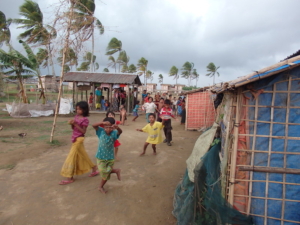Fishermen to the Rescue: Refugees in Indonesia
 Indonesia is estimated to currently host 9,991 refugees and 3,158 asylum seekers, with 57% from Afghanistan, 10% from Somalia and 5% from Myanmar. During 2022 alone, more than 2,000 people are thought to have taken the dangerous journey across the Andaman Sea and the Bay of Bengal in the hope of reaching Indonesia. In 2022, almost 200 individuals reportedly died on this journey. But despite this tragedy, there is an underlying story of hope and humanity from the people of Indonesia. A report from the United Nations showed that in the last six weeks of 2022 alone, Indonesians helped save 472 people from four boats.
Indonesia is estimated to currently host 9,991 refugees and 3,158 asylum seekers, with 57% from Afghanistan, 10% from Somalia and 5% from Myanmar. During 2022 alone, more than 2,000 people are thought to have taken the dangerous journey across the Andaman Sea and the Bay of Bengal in the hope of reaching Indonesia. In 2022, almost 200 individuals reportedly died on this journey. But despite this tragedy, there is an underlying story of hope and humanity from the people of Indonesia. A report from the United Nations showed that in the last six weeks of 2022 alone, Indonesians helped save 472 people from four boats.
In a collaborative effort between the United Nations High Commissioner for Refugees (UNHCR), the Indonesian Government, other U.N. agencies and local people, the country has attempted to protect refugees and asylum seekers by identifying solutions for their situation. This has included provisions for emergency assistance and attention to the specific needs of individuals arriving on their shores.
Rohingya Refugees in Indonesia
A huge proportion of those refugees reaching Indonesia are Rohingya men, women and children. In 2017, nearly 800,000 Rohingya fled persecution from their homeland of Myanmar, where they experienced segregation, discrimination and removal of their citizenship. Since then, thousands of refugees make the perilous journey to reach Muslim-majority regions like Malaysia, Bangladesh and Indonesia. While residing in these Bangladeshi refugee camps, the Rohingya face overcrowded, unsanitary and crime-ridden conditions, which is resulting in greater numbers taking the extremely dangerous trip across the sea, where the likelihood of death increases.
Since November 2022, there were 918 Rohingya refugees registered in Indonesia, in comparison to 180 in the entirety of 2021. In a case from December 2022, over 180 Rohingya refugees arrived in a wooden boat on the shore of western Indonesia, supposedly from Bangladesh, including a pregnant woman and children. These journeys are made in poor-quality boats and often increase between November and April when the seas are supposedly calmer. The UNHCR described 2022 as “one of the deadliest years at sea in almost a decade for the Rohingya” which is predicted to continue into 2023.
Generosity of Indonesian Fishermen
Despite the increasing numbers of refugees making this journey, there is an underlying story of hope and kindness in the actions of some Indonesian fishermen. At the end of 2022, Indonesian fishing crews were praised for their part in rescuing over 200 people adrift at sea, in what has since been described by the UNHCR as an “act of humanity.” In doing so, they have provided urgent medical care for survivors suffering from exhaustion and dehydration. The compassion of these Indonesian fishermen has, according to UNHCR Indonesia Representative Ann Maymann, undoubtedly helped to save people from “certain death, ending [the] torturous ordeals for many desperate people.”
In a case from late June 2020, 99 Rohingya asylum seekers arrived on the shore of Aceh after being stranded at sea for more than 120 days, and local fishermen from nearby villages were quick to help them to safety. The Rohingya have been welcomed by the Indonesian people, even being invited to participate in festivities celebrating the 75th anniversary of Indonesian independence.
There have been numerous explanations as to why the people of Indonesia, particularly the Acehnese residents, have demonstrated such acceptance and humility toward those in need, when so many others have refused to act. For example, the Acehnese people abide by the customary maritime law called Panglima Laot, which obliges all fishermen in the region to help those in distress at sea. This is a central part of village life in coastal communities across Indonesia. Similarly, they honor the cultural tradition of Peumulia Jamee, which encourages them to demonstrate kindness and hospitality, particularly towards children.
Supporting the Humanitarian Effort
The International Organization for Migration (IOM) has supported the Indonesian Government along with their humanitarian partners, by aiding the huge numbers of Rohingya refugees arriving on the coast. This includes provisions for water, health care and COVID-19 testing. Moreover, the IOM has worked with local authorities to obtain approval to transfer refugees to a new site in Peunteut, Lhokseumawe, which will greatly improve safety and security. The assistance provided by the IOM to the Rohingya refugees is funded by the U.S. Department of State’s Bureau of Population, Refugees, and Migration (PRM) and the European Civil Protection and Humanitarian Aid Operations (ECHO).
Steps are being taken to help the Indonesian people assist those arriving on their shores, but it is indicative of a much larger problem. Nevertheless, Indonesian fishermen are aiding refugees by showing kindness.
– Bethan Marsden
Photo: Flickr
